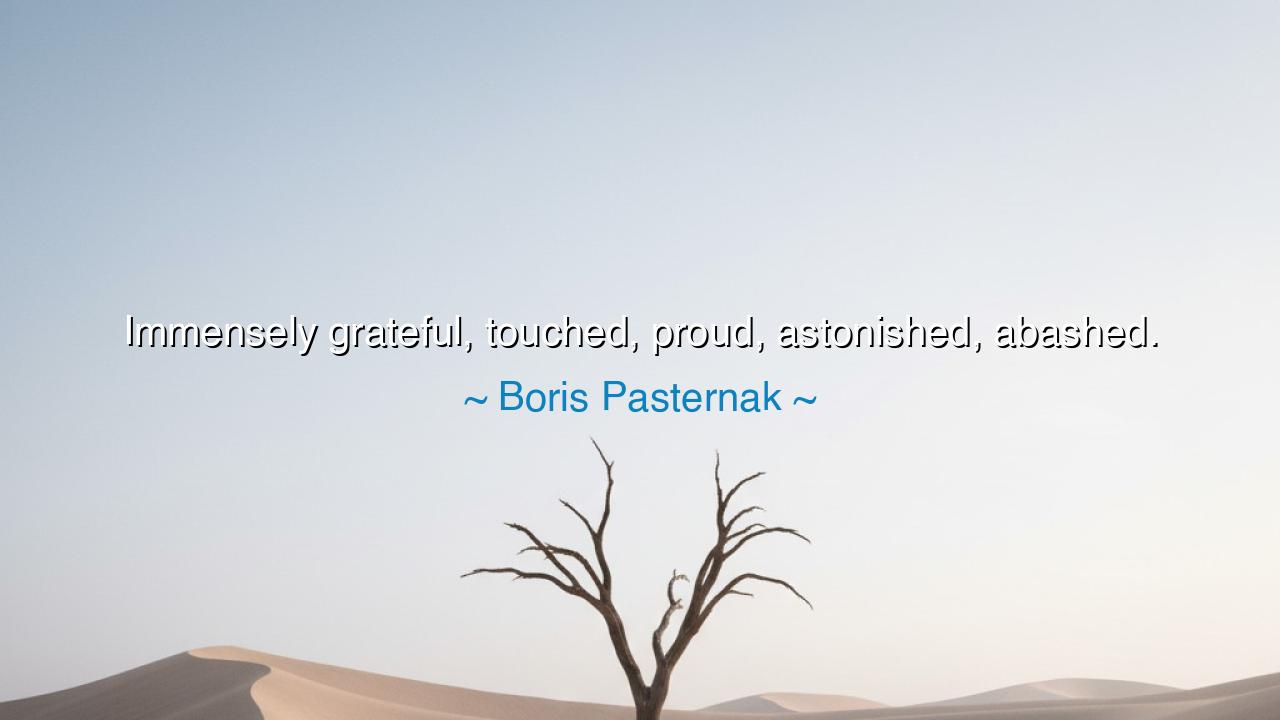
Immensely grateful, touched, proud, astonished, abashed.






The words of Boris Pasternak, “Immensely grateful, touched, proud, astonished, abashed,” are not merely a string of emotions, but the outpouring of a soul overwhelmed by recognition, by the weight of honor, and by the paradox of human achievement. Pasternak, the Russian poet and author of Doctor Zhivago, spoke these words when confronted with the Nobel Prize for Literature, though he was later forced under political pressure to decline it. These five emotions together form a map of the human heart when it stands before greatness, not only in triumph, but in the awe of responsibility and the humility of unworthiness.
To be immensely grateful is the beginning of wisdom. Gratitude acknowledges that all honor and success are not born from one’s efforts alone but are woven by the threads of countless influences — family, teachers, history, providence. Pasternak, who endured censorship, hostility, and the iron grip of Soviet rule, recognized that his work survived not only by his hand but by forces beyond him. Gratitude lifts triumph out of pride and places it into the realm of shared humanity, where all victories are seen as gifts.
To be touched is to feel the vulnerability of being seen. Recognition pierces the armor of stoicism, reaching the tender place of the heart that longs to know it has not labored in vain. For Pasternak, whose writings had been condemned in his homeland, the world’s acknowledgment was both balm and wound — balm because it affirmed his vision, wound because it exposed him to greater persecution. Yet to be touched is to remain human; it is the reminder that success is not only a crown for the mind, but a comfort for the heart.
To be proud is not arrogance but the rightful satisfaction of knowing one’s work has carried meaning into the lives of others. Pride here is not selfish, but communal, a pride that one’s suffering, labor, and craft have borne fruit. In this sense, Pasternak’s pride was heroic, for it proved that truth could not be silenced by tyranny. The ancients, too, knew this pride: the warrior who fought not for his own name but for his people, the artist who created not for himself but for the glory of beauty itself.
To be astonished is to stand before the mystery of destiny. Pasternak could not have foreseen that his writings, smuggled beyond Soviet borders, would ignite the world’s admiration. Astonishment is the recognition that our lives often carry ripples beyond what we imagine, that the smallest act of truth may resound across nations. The prophets of old were astonished when their words endured beyond their lifetimes; so too was Pasternak astonished that his poetry could defy the silence imposed upon him.
To be abashed is to feel the humility of unworthiness. Even as the world crowned him, Pasternak bowed his head, knowing that all achievements are incomplete, and all honors rest uneasily upon human shoulders. This is the paradox of greatness: the higher one is lifted, the more one perceives the weight of imperfection. In this humility lies true nobility, for it guards the heart against pride and reminds the soul that glory belongs to something greater than itself.
The lesson for us is this: the full measure of life is found in the harmony of these emotions. Gratitude keeps us humble, tenderness keeps us human, pride gives us strength, astonishment gives us wonder, and abasement gives us humility. When recognition comes, embrace it with all these in balance, for they together form the crown of true humanity.
As practical action, learn to cultivate these responses in your own life. When you succeed, first be grateful. Allow yourself to be touched by the kindness of others. Be proud of honest labor, but never cease to marvel at the mystery of life. And finally, remain humble, knowing that every crown rests only for a moment. In this way, you will live as Pasternak lived in that moment — immensely grateful, touched, proud, astonished, abashed — a soul fully alive, bearing the paradox of greatness with grace.






AAdministratorAdministrator
Welcome, honored guests. Please leave a comment, we will respond soon